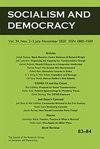巴黎公社:复兴集会,建立全球运动
Q4 Social Sciences
引用次数: 0
摘要
在巴黎公社成立一百周年之际(2021年3月18日至5月28日),《社会主义与民主》此前曾多次讨论过这一主题,本文转载了活跃社会运动组织者对巴黎公社的两次反思。Howie Hawkins,长期的绿党组织者和最近的美国总统候选人,回顾了公社对绿色基层民主概念的影响,然后研究了它在被围困的罗贾瓦(叙利亚北部和东部)的回响。霍金斯并没有忘记罗贾瓦为全球反帝国主义左翼所带来的地缘战略挑战,他关注的是该运动的内部实践。继默里·布克金之后,霍金斯恳请活动人士将基层民主化,并以市政为重点重建运动。他指出,长期以来在州和联邦政府层面普遍存在的民主障碍是可怕的,但在地方层面却没有那么有效。因此,霍金斯认为,在目前的政治条件下,草根民主对绿党来说是最实际的政治,而不仅仅是原则。如果说霍金斯被在敌对的政治背景下绿党作为第三党所面临的政治战略僵局所鼓舞,那么古斯塔夫·马西亚同样受到启发,理解公社对另类全球化运动的教训,它本身面临着早期的承诺,但轨迹不确定,这反映在世界社会论坛的进程中。谈到公社的社会内容,马西哈一方面描绘了公社的工人阶级特征和跨阶级联盟之间的联系,另一方面描绘了构成另类全球化运动的复杂行动者集团之间的联系。尽管现代工人阶级是突出和核心的,但他们发现自己的关切、表达、网络和具体挑战与更广泛的文明问题重叠、清晰、交织在一起,并产生共鸣本文章由计算机程序翻译,如有差异,请以英文原文为准。
The Paris Commune: Reviving Assemblies, Building Global Movements
With the sesquicentennial anniversary of the Paris Commune (18 March–28 May 2021) Socialism and Democracy, having previously addressed the topic on several occasions, reproduces two reflections on the Commune from organizers within active social movements. Howie Hawkins, long time Green Party organizer and its most recent US presidential candidate, revisits the Commune’s influence on Green conceptions of grass-roots democracy before examining its echo in the besieged Rojava (North and East Syria). Not oblivious to the geostrategic challenges that Rojava creates for the global antiimperialist left, Hawkins focuses on the internal practices of the movement. Following Murray Bookchin, Hawkins implores activists to democratize the grass roots and rebuild movements with a municipal focus. He notes that longstanding obstacles to democracy prevalent at the state and federal levels of governance are formidable but not as effective at the local level. As such, Hawkins argues that – more than principle – grass-roots democracy is themost practical politics available to Greens under present political conditions. If Hawkins is animated by the political–strategic impasse facing the Greens as a third party in a hostile political context, Gustave Massiah is similarly inspired to understand the Commune’s lessons for the Alterglobalization movement, itself confronting early promise but an uncertain trajectory, one reflected in World Social Forum process. Turning to its social content, Massiah draws connections between, on the one hand the Commune’s working-class character and cross-class alliances and, on the other hand, the complex bloc of actors constituting the Alterglobalization movement. While prominent and central, the latter-day working class finds its concerns, expressions, networks and concrete challenges overlapping, articulated, woven in and resonating with broader civilizational questions including the
求助全文
通过发布文献求助,成功后即可免费获取论文全文。
去求助
来源期刊

Socialism and Democracy
Social Sciences-Sociology and Political Science
CiteScore
0.50
自引率
0.00%
发文量
34
期刊介绍:
Socialism and Democracy is committed to showing the continuing relevance of socialist politics and vision. Socialism and Democracy brings together the worlds of scholarship and activism, theory and practice, to examine in depth the core issues and popular movements of our time. The perspective is broadly Marxist, encouraging not only critique of the status quo, but also informed analysis of the many different approaches to bringing about fundamental change, and seeking to integrate issues of race, gender, sexuality, ethnicity and nationality with the traditional focus on class. Articles reflect many disciplines; our geographical scope is global; authors include activists and independent scholars as well as academics.
 求助内容:
求助内容: 应助结果提醒方式:
应助结果提醒方式:


